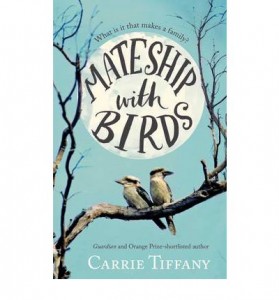lip lit: Mateship with Birds

If a stranger were to follow you around for a day, how would they describe your life? Do you imagine a twenty-first century styled gossip columnist approach or could you, like author Carrie Tiffany, produce an account of people’s habits, whether good, bad, disturbing or tragic, with the same detached interest of a bird-watcher?
Tiffany’s Mateship with Birds is a tribute to the, same titled, book on bird notes by Australian Alec Chisholm in 1922.
The novel, Tiffany’s second, follows the life of neighbours around a small dairy farm in Cohuna, country Victoria, in 1953. Betty, a middle-aged unmarried woman with two children, doesn’t believe a man would ever want her again, lives in a farmhouse next to a lonely dairy farmer. Harry, who’s wife left him many years prior has become the closest father figure the two children have ever had.
Harry is a lonely farmer with tenderness and love for his stupid, malleable cows and pastures and spends his evenings avidly watching a family of “knockabout” kookaburras. A year worth of these observations are dictated to the reader.
Indeed, without these sporadic references to the routines, instincts and ways of the birds, the reader may well wonder what purpose Tiffany’s disjointed and almost non-detailed writing serves.
The very fact that it is underwritten reveals Tiffany’s strengths and the uniqueness of her writing: the novel is non-judgmental. Like a set of Wikileaks cables, the reader is given the facts as Tiffany simply attempts to document the lives of some, arguably damaged, people, with limited reference to their past and context.
Mateship with Birds is about sex, and sex in many different forms; it explores young lust, adult love, isolation, and damaged love. It is through these notions of sex, love and family that the observations of the farm animals and birds coincide with those of the humans.
When Harry begins to observe Michael (Betty’s son) awkwardness with a girl from school, he seeks to educate him; remembering his own ignorance about sex on his wedding night. In order to educate Michael on all the things Harry wished he knew when he was of a similar age, Harry makes reference to the animals. For example, likening his ex-wife’s eyes when in a state of excitement to his heifers when they have the staggers.
While Tiffany’s writing is nice break from the sensationalist and dramatized language that pervades modern society, it is at times confronting. Sex, love and lust are all described with a gritty realism and with a scientific interest for details.
By Eileen McInnes
Carrie Tiffany was awarded the 2013 Stella Book Prize for Mateship with Birds. Her first novel Everyman’s Rules for Scientific Living, was shortlisted for the Orange Prize, the Miles Franklin Literary Award, the Guardian First Book Award and the Commonwealth Writers’ Prize, and won the Dobbie Award for Best First Book and the WA Premier’s Award for Fiction.


Pingback: Review: Mateship with Birds | Eileen McInnes